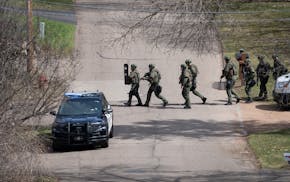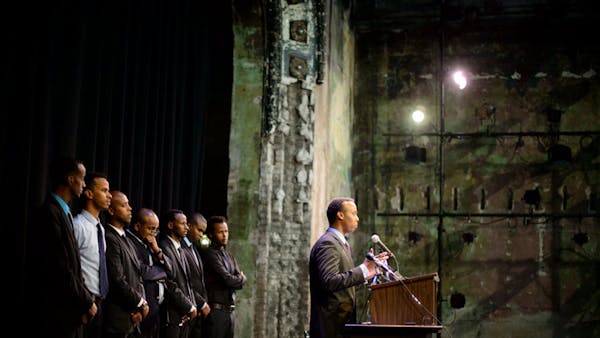The 40-minute recruiting video is as slick as any marketing tool aimed at men in their 20s: patriotic music, commitment to a greater good, guns, even the promise of enjoying life in "the real Disneyland."
"Minnesota's Martyrs: The Path to Paradise" features three young Minnesotans who traveled to Somalia to fight for the terror organization Al-Shabab and, ultimately, to die for their cause.
The video caused little stir when it was released on YouTube in August.
But the Al-Shabab bombing of a Nairobi, Kenya, shopping mall and the potential suggestion that Minnesotans may have been recruited to participate in the attack are renewing concerns that young men from Minnesota continue to be recruited to Al-Shabab training camps.
With the largest Somali population in the United States, the Twin Cities area has been a target for Al-Shabab recruiters.
Federal agents have been investigating Minnesota's terror pipeline for seven years. The FBI estimates 20 young Somali men have left Minnesota to join the terror group since 2007.
Twitter posts and a Kenyan government official have made vague claims of a Minnesota connection to the terrorists' attack in Nairobi, but there have been no official confirmations of those who were involved.
Under that cloud, Somali leaders and law enforcement officials say Al-Shabab recruitment in the Twin Cities is ongoing. But whether the numbers have changed is hard to quantify.
"We're aware of some of these efforts, but it's difficult to determine how widespread it is," said FBI spokesman Kyle Loven.
'Everybody is watching'
Previous investigations of Al-Shabab recruitment have focused on whether some Twin Cities mosques were breeding grounds for religious extremism.
Now, recruitment seems to be happening door-to-door on a much smaller and more discreet scale, said Abdirizak Bihi, a Twin Citian whose nephew was recruited by the terror organization and later killed. Antagonism toward Al-Shabab has reached the point where some mothers will point out recruiters, he said.
"It is still going on, but I don't think it's as bad as it was." Bihi said. "Law enforcement is tough. The genie is out of the bottle and parents are watching and everybody is watching."
The notion that Minnesota remains an active recruiting ground for Al-Shabab was met with skepticism inside Safari Restaurant on Lake Street, a meeting place for Somalis.
Co-owner Abdirahman Ahmed said he's lived here for 12 years and has never seen anyone trying to influence or recruit anyone. He said he has "zero" concern about recruiting for Al-Shabab happening in the Twin Cities.
Video is sentimental, graphic
As slick as it was in production values, the recruitment video caused little stir when it was released.
"A lot of people in the community see it for what it is," said the FBI's Loven. "Unfortunately, there are a few young men with whom the message resonates. They are the ones who are going to be susceptible to travel to Somalia."
The video is both sentimental and violent. Video of young men in shemaghs marching crisply in uniforms is interspersed with shots of the University of Minnesota campus and a walking tour through the Minneapolis-St. Paul International Airport. There are graphics featuring a Roosevelt High School diploma and pictures of dead children lying bloody on the ground.
The three featured Minnesotans are Dahir Gure, Mohammad Hassan and Troy Kastigar, who all died in 2009. In the video, Kastigar, a 28-year-old convert who was known as Abdirahman, is the most animated.
With a front tooth missing, Kastigar speaks enthusiastically in English to potential recruits.
"This is the best place to be, honestly," he says. "I can only tell you that you have the best of dreams, you eat the best of food, and you are with the best of brothers and sisters who came here for the sake of Allah. If you guys only knew how much fun we have over here. This is the real Disneyland. You need to come here and join us."
Later, his body is videotaped as a colleague raps in English off-screen: "The life of this world is temporary, but the home here after everlasting."
The video surfaced amid reports that Al-Shabab itself was engulfed in internal dissension and may reflect a belief from its leadership that it needed to rebrand itself.
"Most Somalis have distanced themselves from Al-Shabab once they started to blow themselves up," said Bob Fletcher, a former Ramsey County sheriff who now teaches courses on Al-Shabab and the local Somali community. "They need to repackage in order to continue."
Staff writers Allie Shah and Richard Meryhew contributed to this report.
Mark Brunswick • 612-673-4434
![St. Louis County Board approved a plan to distribute $24 million in CARES funding, including $6 million to be distributed to small businesses. ] ALEX](https://arc.stimg.co/startribunemedia/ED62G7Y2RWISNRUZQRT3ZTJVHU.jpg?h=91&w=145&fit=crop&bg=999&crop=faces)
Duluth man sentenced to 40 years for role in drive-by shooting that killed 19-year-old

Man killed in Minnetonka by law enforcement started gun battle with deputies, BCA says
Woman charged after police recover 124 cats from Crystal home
Neal: Future can't come fast enough for Wild

